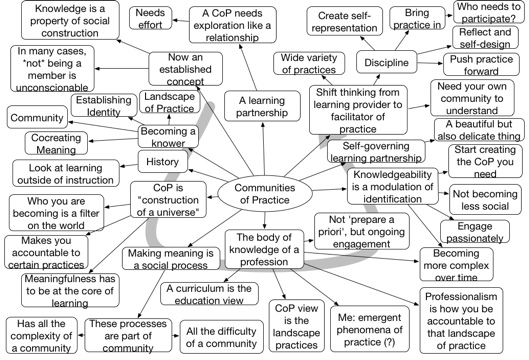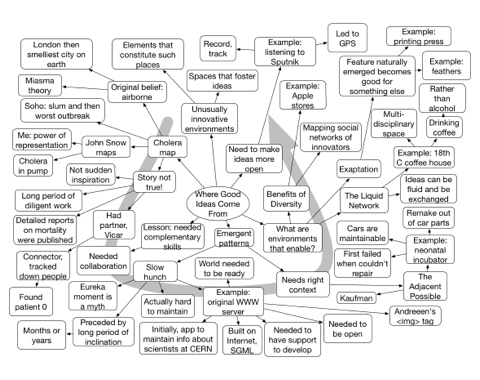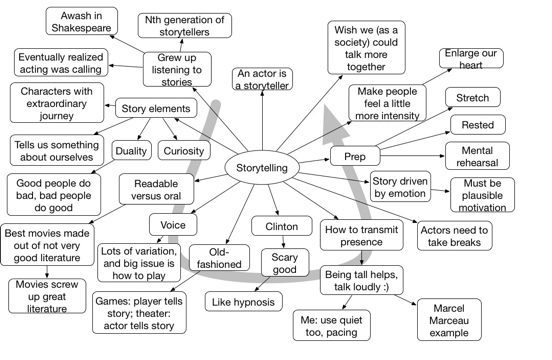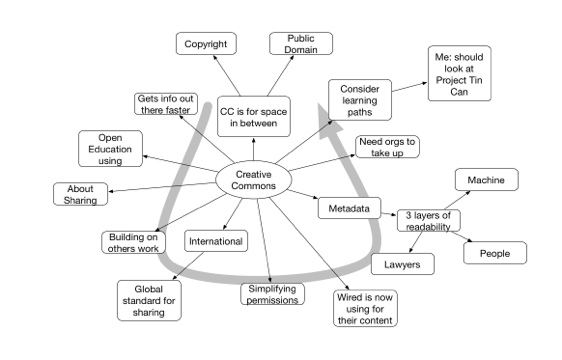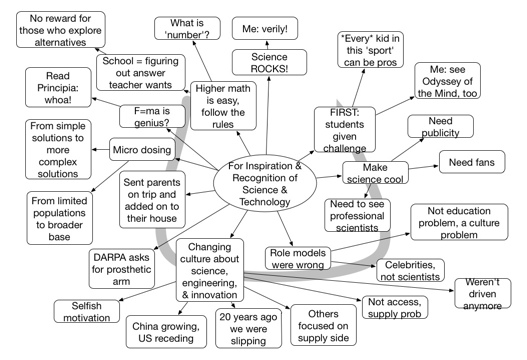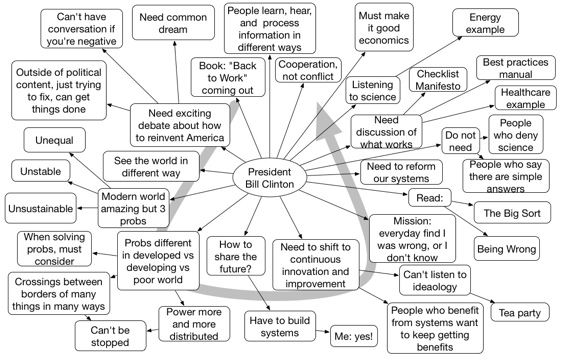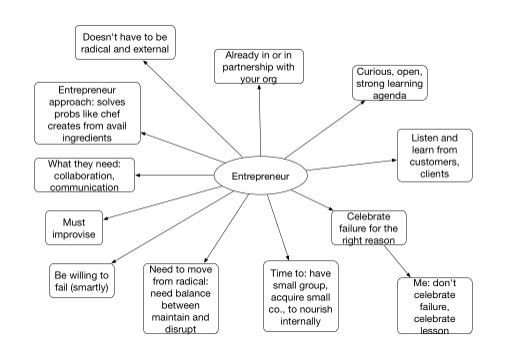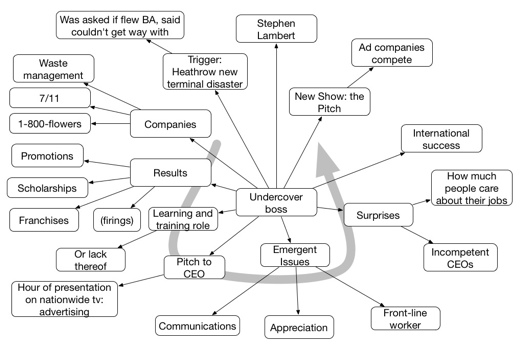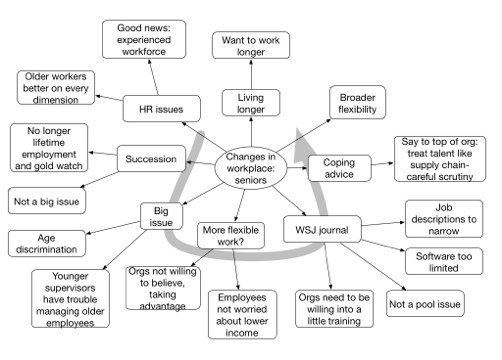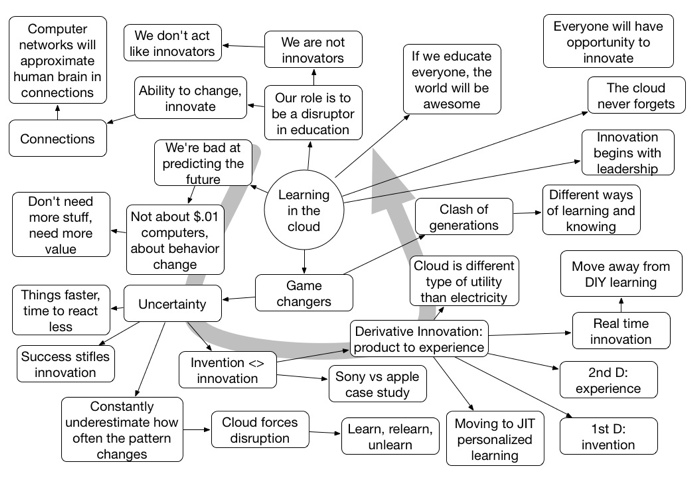At the CSTD meeting, Etienne was the morning keynote, and gave a erudite exploration of the philosophical background and characteristics of Communties of Practice.
Archives for November 2011
Stephen Berlin Johnson Keynote Mindmap
Here at the very friendly Canadian Society for Training & Development annual conference, Stephen Berlin Johnson gave a great keynote telling the story of innovation. In it, he busted the myth of individual inspiration and instead pointed to the contributions of the slow hunch, diverse inputs, and continual communication & collaboration.
Telecom Travel Travails
Ok,so I’m ‘abroad’ in Canada, and they have different carriers, so I can’t blithely use data like I normally do. Well, I’m told that the conference center has no wifi, and it’s away from the hotel, so I figured I didn’t want to be out of touch, so I’d look into data packages.
Now the story gets interesting: the guy who gave the ‘reduced’ call rate said that the package was 125 MB for $50, but that since I would be only there a few days, that the cost would be prorated but I could use all the data. That’s too much money overall, but prorated… I wanted time to think about it, so I called back to order. This lady said it would be prorated,b it only for my time into the month, so half price for half the data. 65MB, that should be enough.
And, sure enough, I set my device to only use email (I think), and it’s 1.5 MB when I land (hours later) and 2.2 some hours after that. At that rate, I’ll be good. Then after going out to dinner with colleagues, it’s 77 MB used!?! And I have wifi in the hotel, so I was using that on the iPad!
I call AT&T and this time the guy says it’s the full rate for the full data (which I wouldn’t have paid, too high), so I’m OK on the data, except I’m not; at that rate, I’ll go over the limit. He has not the same record of data usage, but says “bookkeeping” could take a while. E.g. he has no reason why my usage suddenly spiked, which means I can’t take the chance.
So here I am, with three different stories about how much I’m paying and getting (two of which got me to buy more than I intended by, effectively, deception), no ability to determine the source of data usage (certainly at least largely due to Apple’s impenetrable data usages, and I’m not too dense), and consequently out of money, data, and contact.
Just to add icing to the cake, despite paying for wifi, I am still getting pop-up ads! Grumble, mumble…
John Lithgow Keynote Mindmap
Learning 2011 Day 2 Morning Mindmaps
This morning Elliott interviewed Cathy Casserly from Creative Commons and Dean Kamen. Cathy was a passionate advocate for openness and sharing. She talked about going further into learning, and I was reminded about Project Tin Can, making a more general learning path. Dean recited his interesting childhood and then launched into his inspiring project to make science cool again.
Layered Learning
Last week, I posted about a model where a system could provide a sage who looks at the events of your life and provides support. I want to elaborate that model by looking at it in a different way.
 The notion here is that you have events in your life, across the bottom. And you have some learning goals, e.g. to learn about project management, and about running meetings. You might get some initial content about those two goals, but then let’s focus on developing that learning over time.
The notion here is that you have events in your life, across the bottom. And you have some learning goals, e.g. to learn about project management, and about running meetings. You might get some initial content about those two goals, but then let’s focus on developing that learning over time.
The events in your life give you a chance to use them as learning experiences, not just performance opportunities. If there are not enough in your life, you might have interstitial activities (those in dashed lines), but you can be developed across learning goals abcd, and uvwxyz, both through delivered experiences, and with learning wrapped around real experiences.
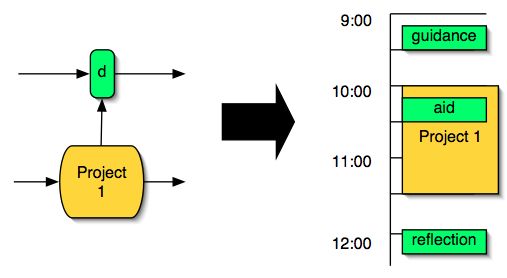 Let me make that latter clearer. Say you’ve got some event like project work, and an associated learning goal (e.g. concept ‘d’ in a curricula). A system could see the calendar entry for the project work and, through tagging or other semantic means, recognize the relationship with learning goal ‘d’. Then, some relevant activation and concept material might precede the event, an aid could appear during, and either a self-evaluation metric or a connection to a live person could happen afterward. Delivered, for instance, through mobile devices.
Let me make that latter clearer. Say you’ve got some event like project work, and an associated learning goal (e.g. concept ‘d’ in a curricula). A system could see the calendar entry for the project work and, through tagging or other semantic means, recognize the relationship with learning goal ‘d’. Then, some relevant activation and concept material might precede the event, an aid could appear during, and either a self-evaluation metric or a connection to a live person could happen afterward. Delivered, for instance, through mobile devices.
The goal is to use the events in your life as learning opportunities as much as possible (or preferable). We can also mix in some simulated practice (e.g an alternate reality game) if it’s not occurring at a sufficient rate in real life, but the goal is to match the learning development plan to the rate at which we effectively learn. And, to be clear, we do not learn effectively by a one-off knowledge dump and a quiz, as much of what we do actually works out to be.
As I’ve mentioned before, we have the magic, the sufficiently advanced technology Arthur C. Clarke talked about, to hand. We should start using it to develop us towards our goals in appropriate ways. The opportunity is there; who’s ready to seize it?
